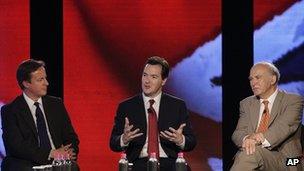Coalition leaders agree there is no Plan B strategy
- Published

Cameron, Osborne and Cable agree on macro-economic strategy
After a fightback article by the prime minister, who wanted to prove that he is no mouse, an interview with the chancellor who asserted that he is 110% committed to the job of reviving the economy, and another with the business secretary who felt the need to prove that he was not "on manoeuvres" against Nick Clegg, just one phrase stuck out.
It came from the Liberal Democrat, Vince Cable, who told Radio 4's World this Weekend: "There is no Plan A, B, C or V which provides an alternative."
For all the recent tension between the coalition parties, for all the questioning of George Osborne's tenure at the Treasury or Nick Clegg's leadership it illustrates that there is little or no division at the top of the coalition about macro-economic strategy.
This makes it quite unlike previous governments faced by economic crises.
The Wilson government split over devaluation in the late 1960s.
Ted Heath's government divided over his famous economic U-turn after unemployment topped one million in 1972.
Jim Callaghan's administration could not carry the Labour Party or the unions with it as it sought to control inflation in the late '70s.
Mrs Thatcher's first government was bitterly divided between economic "wets" and "drys" at the beginning of the '80s as many doubted three million unemployed was a "price worth paying" and later, her third administration, warred in the late '80s over whether to tie the pound to other European currencies.
Now, however, after a double-dip recession, government borrowing beginning to rise again and the prospect of stagnant growth for months if not years to come there is no such divide.
It is a fact worth dwelling on as the coalition prepares for a bloody first week back after the summer break.
The man David Cameron beat for the Tory leadership, David Davis, will try to show that there is an alternative economic approach (other than Labour's slower, shallower cuts).
His argument for tax cuts paid for by deeper spending cuts plus deregulation will resonate with many Tories but unless someone who sits around the Cabinet table starts making a similar case it is unlikely to make much impact.